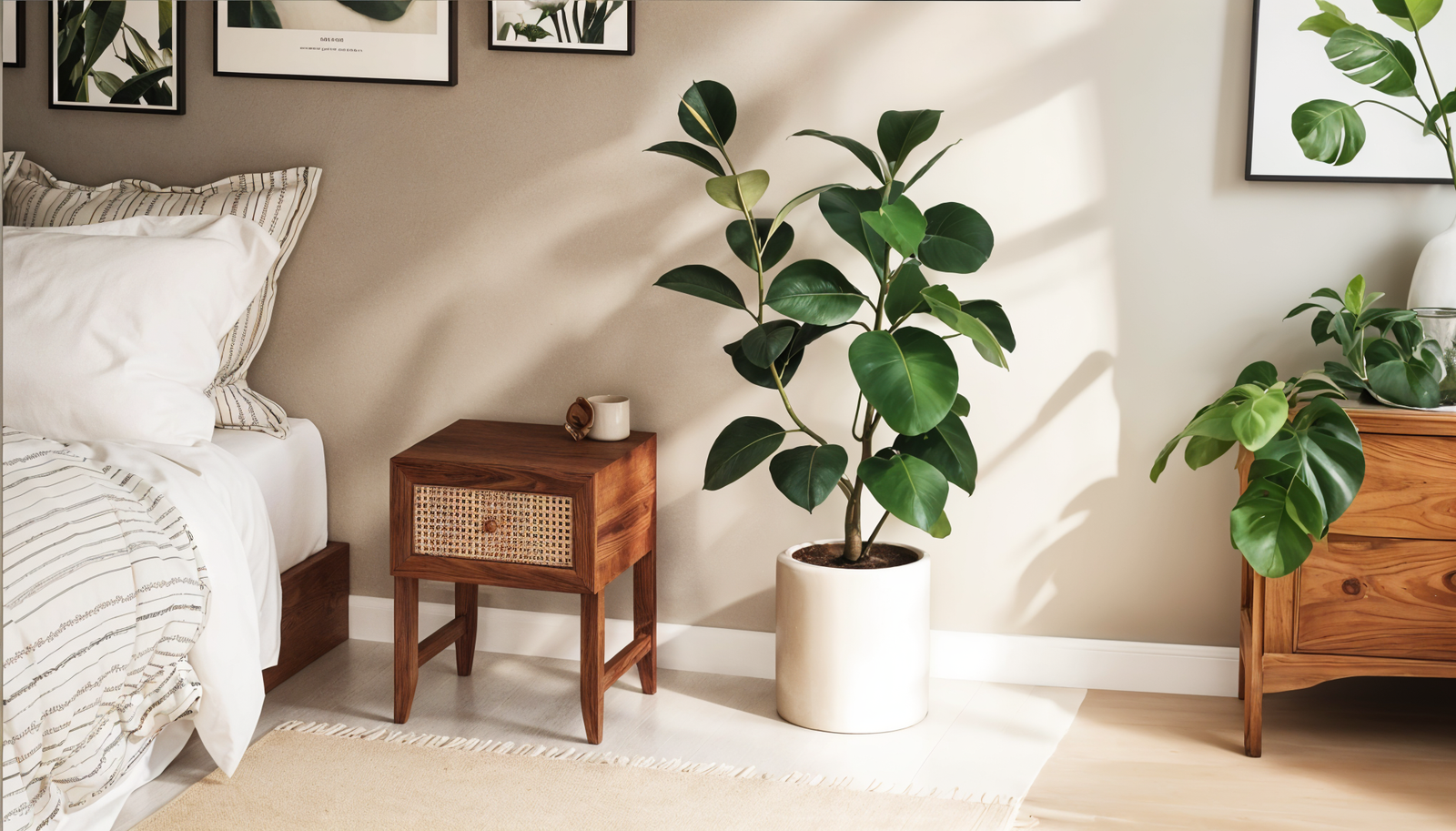🤍 Unmatched Quality, Authentic Craftsmanship
🤍 Unmatched Quality, Authentic Craftsmanship
🤍 Unmatched Quality, Authentic Craftsmanship
Welcome to our guide on how to decorate a bedroom Japanese style!
If you're looking to create a serene and tranquil space that reflects the beauty of Japanese culture, you've come to the right place.
In this article, we will walk you through the process of transforming your bedroom with minimalist and Zen-inspired elements, from choosing the right color palette to incorporating traditional Japanese furniture.
Get ready to embrace the elegance and tranquility of Japanese interior design!

The Zen philosophy plays a fundamental role in Japanese interior design, influencing its essence and guiding principles.
By embracing Zen philosophy, we can create a serene and harmonious space that reflects the minimalist nature of Japanese bedroom decor.
Zen philosophy emphasizes simplicity, mindfulness, and the connection between mind, body, and environment.
It encourages us to unclutter our physical and mental spaces, seeking inner peace and tranquility.
In Japanese interior design, Zen principles guide us to focus on essential elements, eliminate unnecessary distractions, and foster a sense of calmness.
In Japanese bedroom decor, minimalism plays a crucial role in creating a serene and harmonious space.
By embracing minimalism, you can transform your bedroom into a minimalist oasis that promotes relaxation and tranquility.
In this section, we will discuss the key essentials of minimalist bedroom ideas, including decluttering, simplifying color schemes, and maximizing natural light.
One of the first steps to creating a minimalist bedroom is decluttering. Remove any unnecessary items and keep only the essentials.
Minimalist decor focuses on clean lines and simplicity, so it's important to eliminate any clutter that can disrupt the overall aesthetic.
Consider minimalist storage solutions, such as hidden drawers or wall-mounted shelves, to keep your bedroom organized and free from visual distractions.
When it comes to color schemes, simplicity is key. Stick to neutral tones, such as whites, creams, and grays, to create a calming and harmonious atmosphere.
Avoid using bright or bold colors that can be visually overwhelming.
By simplifying the color palette, you can create a sense of serenity and sophistication in your bedroom.
Additionally, maximizing natural light is essential in minimalist bedroom design.
Allow as much natural light as possible to fill your space, as it not only enhances the overall ambiance but also creates a sense of spaciousness.
Avoid heavy curtains or blinds that block natural light, and opt for sheer or light-filtering window treatments to maintain privacy while still letting light in.
You can also strategically place a mirror to reflect natural light and create the illusion of a larger space.

| Decluttering | Simplifying Color Schemes | Maximizing Natural Light |
|---|---|---|
| - Remove unnecessary items - Utilize minimalist storage solutions - Maintain visual cleanliness |
- Stick to neutral tones - Avoid bright or bold colors - Create a sense of serenity |
- Allow natural light to fill the space - Use light-filtering window treatments - Place mirrors strategically |
In this section, we will dive into the practical aspects of decorating a bedroom Japanese style.
By following these tips, you can create a bedroom that embodies the elegance and tranquility of Japanese design.
Let's explore the use of tatami mats for flooring, the importance of choosing the right color palette, and the role of natural light in creating a serene atmosphere.
One of the key elements in Japanese bedroom decor is the use of tatami mats for flooring.
These traditional straw mats not only add authenticity to your space but also provide a natural and comfortable surface to walk on.
Tatami mats are known for their durability and insulation properties, keeping your room cool in summer and warm in the winter.
Additionally, the light tan color of tatami mats complements the overall aesthetic of a Japanese-style bedroom.

Color plays a crucial role in Japanese interior design. When decorating your bedroom Japanese style, opt for a calming and neutral color palette inspired by nature.
Earthy tones such as beige, cream, and taupe can create a serene atmosphere.
Additionally, incorporating pops of color inspired by traditional Japanese art, such as cherry blossom pink or deep indigo, can add visual interest to the space.
Remember to keep the colors balanced and harmonious, avoiding overwhelming or jarring combinations.
Natural light is highly valued in Japanese design as it enhances the sense of tranquility and connection to nature.
To create a Zen-like bedroom, maximize the amount of natural light in the space.
Opt for sheer curtains or blinds that allow sunlight to filter through while maintaining privacy.
Position your bed and furniture in a way that prioritizes natural light, allowing it to illuminate the room.
If your bedroom lacks natural light, consider incorporating soft and warm lighting fixtures that mimic the glow of sunlight.
| Benefit of Tatami Mats | Role of Color Palette | Importance of Natural Light |
|---|---|---|
| Provide a natural and comfortable flooring surface. | Create a calming and serene atmosphere. | Enhance the sense of tranquility and connection to nature. |
| Offer durability and insulation properties. | Add visual interest inspired by traditional Japanese art. | Maximize the amount of natural light in the space. |
By incorporating tatami mats, choosing the right color palette, and embracing natural light, you can transform your bedroom into a serene and peaceful oasis that reflects the beauty of Japanese design.
Let's move on to the next section, where we will explore the various types of traditional Japanese furniture and how to incorporate them into your bedroom decor.
Traditional Japanese furniture plays a vital role in adding authenticity and cultural richness to a Japanese-inspired bedroom.
By incorporating these unique pieces, you can create a space that reflects the timeless beauty of Japanese design.
Explore various types of traditional Japanese furniture from Mojo Boutique and discover how to seamlessly incorporate them into your bedroom decor.

In Japanese bedroom design, low bed frames are a popular choice.
These simple and low-profile beds create a sense of intimacy and openness in the room.
To achieve an authentic Japanese aesthetic, consider choosing a bed frame made of natural materials like wood.
Traditional Japanese furniture emphasizes simplicity and functionality.
Incorporate minimalist drawers and cabinets to declutter your bedroom and maintain a serene environment.
Look for furniture with clean lines and natural finishes to complement your Japanese-inspired decor.
Shoji screens are another iconic element of Japanese design.
These sliding doors made of translucent paper and wooden frames add elegance and privacy to your bedroom.
You can use them as room dividers or as decorative accents that evoke a sense of traditional Japanese architecture.
Tatami mats are traditional Japanese flooring mats made of rice straw.
They provide a soft yet firm surface that adds warmth and authenticity to your bedroom.
You can use tatami mats as a foundation for your bed or as a seating area in a corner of the room.
By incorporating these traditional Japanese furniture pieces, you can transform your bedroom into a harmonious and serene space that showcases the beauty of Japanese design.
Embrace the rich cultural heritage by infusing your bedroom with these timeless elements.
Feng Shui, the ancient Chinese art of harmonizing the energy flow in a space, plays a significant role in Japanese bedroom decor.
In this section, we will explore the principles of Feng Shui and how they can be applied to create a harmonious and balanced bedroom environment.
From arranging furniture to choosing the right accessories, you'll learn how to create a bedroom that promotes positive energy and wellbeing.

Feng Shui is based on the idea that the arrangement of objects in a space can affect the flow of energy, or "chi."
In a Japanese-inspired bedroom, the goal is to create a harmonious space that promotes relaxation and tranquility.
One important aspect of Feng Shui in bedroom arrangement is the placement of furniture.
It's essential to have a clear and open layout, allowing energy to flow freely.
Avoid placing furniture in a way that obstructs the natural pathways of the room.
Position your bed in a commanding position, with a solid wall behind it and a clear view of the door.
When it comes to choosing accessories, opt for items that enhance the peaceful atmosphere of the room.
Consider incorporating elements of nature, such as natural materials and colors.
Bamboo plants, wooden furniture like minimalist bed frames, headboards, nightstands, etc., and soft textiles can create a sense of harmony in the space.
Additionally, lighting is an essential aspect of Feng Shui in Japanese bedroom decor.
Choose soft, warm lighting options to create a calming ambiance. Avoid harsh overhead lighting and opt for softer options, such as bedside lamps or paper lanterns.
By applying the principles of Feng Shui to your bedroom arrangement and decor choices, you can create a harmonious space that promotes positive energy and contributes to a sense of serenity and wellbeing.
Natural accents and materials are essential elements in creating Zen-inspired bedroom decor.
By integrating greenery and organic materials, such as bamboo and wood, into your bedroom design, you can transform your space into a peaceful sanctuary.
Bringing nature indoors is a key aspect of Zen bedroom decor. Incorporating plants, such as bonsai trees or bamboo, can add a touch of serenity to your space.
Place potted plants strategically around the room to create a harmonious balance.
The natural colors and textures of plants and organic materials will evoke a sense of tranquility and connection with nature.
When it comes to color schemes for a Zen bedroom, opt for earthy tones like neutrals, muted greens, and soft browns.
These colors promote a calming atmosphere and provide a strong foundation for a serene space.
Consider using textured elements, such as natural fibers, jute rugs, or wooden furniture, to add depth and visual interest to your bedroom.
Combining different textures will create a multi-dimensional and soothing ambiance.
| Benefits of Natural Accents in Zen Bedroom Decor |
|---|
| Enhances relaxation and reduces stress |
| Brings the outdoors in, promoting a connection with nature |
| Creates a calming and soothing atmosphere |
| Adds visual interest and depth to the space |
Incorporating natural accents and materials into your Zen bedroom decor will not only create a harmonious and serene atmosphere but also promote a deeper sense of peace and tranquility.
By integrating greenery, organic materials, earthy tones, and textures into your design, you can transform your bedroom into a sanctuary of relaxation and rejuvenation.
A Japanese inspired bedroom goes beyond just decor; it encompasses the rich cultural traditions and aesthetics of Japan.
Let's explore how you can infuse your bedroom with these cultural elements.
One way to incorporate Japanese culture into your bedroom is through traditional artwork.
Hang paintings, prints, or calligraphy with Japanese motifs such as cherry blossoms, landscapes, or kanji characters.
These pieces not only add visual interest but also reflect the artistic heritage of Japan.
Another cultural element to consider is the use of paper screens, also known as shoji screens.
These screens can be used as room dividers or as decorative accents.
Their delicate and translucent nature adds a sense of elegance and privacy to your bedroom.
Sliding doors, known as fusuma or shoji doors, are another traditional feature that can enhance the Japanese aesthetic of your bedroom.
These doors slide on wooden tracks and can be used to separate different areas of your room or create a sense of openness.
By incorporating traditional Japanese artworks, paper screens, and sliding doors into your bedroom design, you can create a space that truly embraces the cultural heritage and aesthetics of Japan.
Accessories play a crucial role in Japanese bedroom decor, adding personality and charm to the space.
These carefully chosen accents can enhance the overall aesthetics of your Japanese-inspired bedroom, creating a serene and harmonious atmosphere.
In this section, we will provide advice on choosing the right decorations and maintaining clutter-free surfaces to achieve a minimalist and peaceful space.
When selecting decorations for your Japanese bedroom, it's important to keep the overall theme and style in mind.
Incorporating authentic Japanese elements such as artwork, textiles, and lighting fixtures can bring a sense of cultural authenticity to the space.
Consider the following bedroom decoration tips:
By thoughtfully selecting decorations that align with the Japanese design principles of simplicity and tranquility, you can create a harmonious and aesthetically pleasing bedroom.
In Japanese bedroom decor, maintaining clutter-free surfaces is essential to creating a serene and minimalist atmosphere.
Keeping your bedroom organized and free from unnecessary items can promote a sense of calm and tranquility.
Here are some tips for maintaining clutter-free surfaces:
By embracing a minimalist mindset and regularly decluttering, you can maintain a serene and clutter-free space that promotes relaxation and tranquility in your Japanese-inspired bedroom.
| Decoration | Key Features |
|---|---|
| Japanese Artwork | Reflects traditional motifs, adds elegance and tranquility |
| Natural Fiber Textiles | Cotton or silk, simple patterns, clean look |
| Soft Lighting Fixtures | Paper lanterns or rice paper pendant lights, warm ambiance |
Now that you have read the above article, maybe you still have a couple of questions on this topic, so we will answer these questions below.
When decorating a bedroom in Japanese style, consider using tatami mats for flooring to add authenticity.
Choose a color palette that promotes serenity, such as neutral tones or soft pastels.
Ensure your space has ample natural light by using sheer curtains or light-colored window coverings.
Pay attention to the principles of Feng Shui and create a harmonious layout.
Incorporate traditional Japanese furniture, such as low bed frames and minimalist drawers.
Lastly, add organic materials like bamboo and wood, and infuse your bedroom with Japanese cultural elements like traditional artwork and paper screens.
To create a Zen bedroom decor with natural accents, integrate greenery and organic materials like bamboo and wood.
Use plants to bring a sense of calm and nature into your space. Choose earthy tones and textures for your bedding, rugs, and curtains.
By incorporating these natural elements, you can create a peaceful and soothing atmosphere in your bedroom.
You can transform your bedroom into a peaceful retreat by following the principles of Japanese interior design, such as minimalism, natural accents, and Zen philosophy.
Choose calming colors, declutter your space, and create a layout that promotes relaxation. Pay attention to lighting and incorporate elements of nature.
By creating a peaceful retreat, you can escape from the stresses of everyday life.
In conclusion, decorating a bedroom in a Japanese style offers an opportunity to create a serene and harmonious space that promotes relaxation and tranquility.
By embracing the principles of Zen, minimalism, and traditional Japanese design, you can transform your bedroom into a peaceful retreat.
Whether you choose to incorporate tatami mats, traditional furniture, or natural accents, the key is to create a balance between simplicity, functionality, and aesthetics.
Embrace the beauty and serenity of Japanese bedroom design and create a space that brings you inner peace and tranquility.
Let the minimalist and Zen-inspired elements guide you in designing a bedroom that embodies the elegance and tranquility of Japanese culture.


